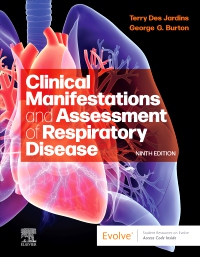
Evolve Resources for Clinical Manifestations & Assessment of Respiratory Disease, 9th Edition
Resources

$0.00
Student Resources on Evolve
- NBRC® correlation guide
- Self-assessment questions and answers
- Case studies
- Appendices
- Glossary
- References
- Bibliographies
-
PART 1: Assessment of Cardiopulmonary Disease
SECTION I: Bedside Diagnosis
- The Patient Interview
- The Physical Examination
- The Pathophysiologic Basis for Common Clinical Manifestations
- Pulmonary Function Testing
- Blood Gas Assessment
- Assessment of Oxygenation
- Assessment of the Cardiovascular System
- Radiologic Examination of the Chest
- Other Important Tests and Procedures
- The Therapist-Driven Protocol Program
- Respiratory Insufficiency, Respiratory Failure and Ventilatory Management Protocols
- Recording Skills and Intra-Professional Communication
- Chronic Obstructive Pulmonary Disease, Chronic Bronchitis and Emphysema
- Asthma
- Cystic Fibrosis
- Bronchiectasis
- Atelectasis
- Pneumonia, Lung Abscess Formation and Important Fungal Diseases
- Tuberculosis
- Pulmonary Edema
- Pulmonary Vascular Disease: Pulmonary Embolism and Pulmonary Hypertension
- Flail Chest
- Pneumothorax
- Pleural Effusion and Empyema
- Kyphoscoliosis
- Cancer of the Lung: Prevention and Palliation
- Interstitial Lung Diseases
- Acute Respiratory Distress Syndrome
- Guillain-Barre Syndrome
- Myasthenia Gravis
- Respiratory Insufficiency in the Patient with Neuro-Respiratory Disease
- Sleep Apnea
- The Newborn Disorders
- Pediatric Assessment, Protocols, and PALS Management
- Meconium Aspiration Syndrome
- Transient Tachypnea of the Newborn
- Respiratory Distress Syndrome
- Pulmonary Air Leak Syndrome
- Respiratory Syncytial Virus Infection (Bronchiolitis)
- Chronic Lung Disease of Infancy
- Congenital Diaphragmatic Hernia
- Congenital Heart Disease
- Croup and Croup-like Syndromes: Laryngotracheobronchitis, Bacterial Tracheitis and Acute Epiglottitis
- Near Drowning/Wet Drowning Smoke Inhalation, Thermal Injuries, and Carbon Monoxide Intoxication
SECTION II: CLINICAL DATA OBTAINED FROM LABORATORY TESTS AND SPECIAL PROCEDURES—Objective Findings
SECTION III: THE THERAPIST-DRIVEN PROTOCOL PROGRAM—THE ESSENTIALS
PART II: Obstructive Lung Disease
PART III: Loss of Alveolar Volume
PART IV: Infectious Pulmonary Disease
PART V: Pulmonary Vascular Disease
PART VI: Chest and Pleural Trauma
PART VII: Disorders of the Pleura and of the Chest Wall
PART VIII: Lung Cancer
PART IX: Environmental Lung Diseases
PART X: Diffuse Alveolar Disease
PART XI: Neuro-Respiratory Disorders
PART XII: Sleep-Related Breathing Disorders
PART XIII: Newborn and Early Childhood Cardiopulmonary Disorders
PART XIV: Other Important Topics
Appendix I
Symbols and Abbreviations Commonly Used in Respiratory Physiology
Appendix II
Agents Used to Treat Bronchospasm and Airway Inflammation
Appendix III
Antibiotics
Appendix IV
Antifungal Agents
Appendix V
Mucolytic and Expectorant Agents
Appendix VI
Positive Inotropes and Vasopressors
Appendix VII
Diuretic Agents
Appendix VIII
The Ideal Alveolar Gas Equation
Appendix IX
Physiologic Dead Space Calculation
Appendix X
Units of Measure
Appendix XI
Poiseuille’s Law
Appendix XII
PCO2/HCO3_/pH Nomogram
Appendix XIII
Calculated Hemodynamic Measurements
Appendix XIV
DuBois Body Surface Area Chart
Appendix XV
Cardiopulmonary Profile
Appendix XVI
Answers to Self-Assessment Questions
Glossary
Index
PART 1: Assessment of Cardiopulmonary Disease
SECTION I: Bedside Diagnosis
- The Patient Interview
- The Physical Examination
- The Pathophysiologic Basis for Common Clinical Manifestations
- Pulmonary Function Testing
- Blood Gas Assessment
- Assessment of Oxygenation
- Assessment of the Cardiovascular System
- Radiologic Examination of the Chest
- Other Important Tests and Procedures
- The Therapist-Driven Protocol Program
- Respiratory Insufficiency, Respiratory Failure and Ventilatory Management Protocols
- Recording Skills and Intra-Professional Communication
- Chronic Obstructive Pulmonary Disease, Chronic Bronchitis and Emphysema
- Asthma
- Cystic Fibrosis
- Bronchiectasis
- Atelectasis
- Pneumonia, Lung Abscess Formation and Important Fungal Diseases
- Tuberculosis
- Pulmonary Edema
- Pulmonary Vascular Disease: Pulmonary Embolism and Pulmonary Hypertension
- Flail Chest
- Pneumothorax
- Pleural Effusion and Empyema
- Kyphoscoliosis
- Cancer of the Lung: Prevention and Palliation
- Interstitial Lung Diseases
SECTION II: CLINICAL DATA OBTAINED FROM LABORATORY TESTS AND SPECIAL PROCEDURES—Objective Findings
SECTION III: THE THERAPIST-DRIVEN PROTOCOL PROGRAM—THE ESSENTIALS
PART II: Obstructive Lung Disease
PART III: Loss of Alveolar Volume
PART IV: Infectious Pulmonary Disease
PART V: Pulmonary Vascular Disease
PART VI: Chest and Pleural Trauma
PART VII: Disorders of the Pleura and of the Chest Wall
PART VIII: Lung Cancer
PART IX: Environmental Lung Diseases



 as described in our
as described in our 